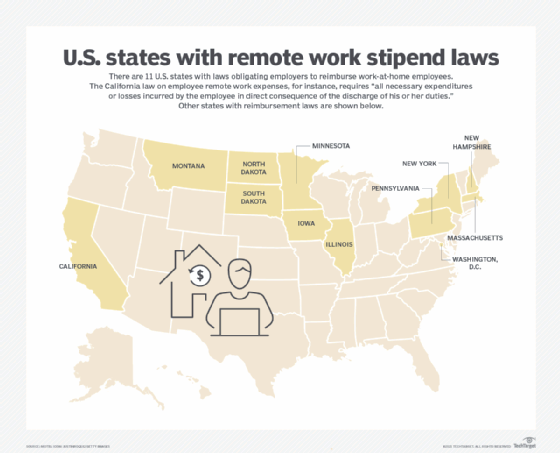Key Rights for California’s Remote Workers
With the rise of remote work in California it’s important to know your rights as a remote employee. This is key to ensuring that you are treated fairly and that your working conditions meet standards. This article will provide an overview of the essential rights that remote workers in California should be aware of covering everything from how you are classified as an employee to health and safety regulations.
In California remote workers are entitled to various rights aimed at safeguarding them just like their on site counterparts. These rights include receiving pay, having a safe work environment and being protected from discrimination. Being aware of these rights is crucial for remote workers to prevent any form of exploitation or mistreatment.
Employment Classification and Remote Work

When you’re working from home it’s important to know how your job classification impacts your rights. In California remote employees can be categorized as either exempt or non exempt and this classification has an effect on different aspects of your work situation.
Exempt Employees are generally salaried and are not entitled to overtime pay. They often hold managerial or professional positions. However, even if you work remotely, your classification should align with your job duties and salary. For instance, a remote manager might be classified as exempt, while a remote customer service representative would be non-exempt.
Non-Exempt Employees are entitled to overtime pay for hours worked beyond the standard 40-hour workweek. If you’re working remotely and your role fits this category, ensure that your employer tracks your hours accurately and compensates you accordingly.
It’s crucial to confirm whether you are classified as an independent contractor or an employee. Independent contractors receive less protection and fewer benefits than employees. Misclassifying your status can result in problems such as losing benefits and encountering wage disagreements. Make sure to review your contract and address any concerns with your employer to ensure you are classified correctly.
Health and Safety Regulations for Remote Workers
Even if you’re telecommuting, Californias health and safety rules still hold true. Its the duty of employers to make sure that their employees working remotely are in a secure setting. This entails providing you with furniture, adequate lighting and an environment that supports productivity.
Employers are required to:
- Conduct risk assessments for home offices if necessary.
- Provide guidelines for maintaining a safe and ergonomic workspace.
- Address any reported hazards promptly.
For instance a buddy of mine who does her job had some trouble with back pain because her chair wasn’t very supportive. After talking to her boss about it they got her a chair and made some changes to her workspace. This kind of assistance is crucial for staying healthy when working from home.
Moreover if you sustain any injuries related to work while telecommuting you could qualify for workers compensation. Its crucial to inform your employer about these injuries and keep detailed records of them. This way you can receive the necessary treatment and reimbursement just like you would in a regular office environment.
Wage and Hour Laws for Remote Employees
In California wage and hour regulations are in place to safeguard employees including those who work from home. Familiarizing yourself with these rules helps ensure you receive pay and that your working hours are properly handled. Whether you are an employee or an employer being aware of these guidelines is crucial, for preventing conflicts and maintaining adherence to the law.
For non-exempt employees, California’s wage and hour laws require payment for overtime. If you’re working remotely and exceed 8 hours a day or 40 hours a week, you should be compensated for those extra hours. Accurate tracking of work hours is essential; employers are expected to maintain detailed records and provide timely paychecks.
A friend of mine who works from home for a company learned the lesson about her overtime not being properly recorded. When she brought it up her employer fixed the records and paid her the back wages. This situation underscored the significance of keeping track of your hours and having open communication with your boss.
For exempt employees, the rules are different. These employees are typically on a fixed salary and not entitled to overtime pay. However, they must still be paid for all hours worked. It’s crucial to understand your classification to know your rights and avoid any potential wage disputes.
Remote Work Equipment and Reimbursements
When you’re doing your job remotely it can be tricky to separate personal and work related expenses, especially when it comes to things like equipment and other costs. In California companies have to cover employees for necessary expenses they incur while working, including the gear and supplies they use for remote work.
Typical costs that may need to be reimbursed encompass.
- Computers and software needed for job functions.
- Office supplies such as printers, paper, and pens.
- Internet and phone bills if these are necessary for performing job duties.
A friend who works from home for a startup had to invest in a fast internet connection and a new computer to fulfill her job requirements. At first she was uncertain whether her costs would be reimbursed but after checking her companys reimbursement policy she managed to get reimbursed. Its always wise to confirm with your employer about which expenses will be reimbursed and to save receipts for your reference.
Privacy and Data Security Requirements
In this era, safeguarding privacy and data is crucial, particularly for remote employees dealing with information. California enforces regulations to safeguard both personal and professional data and these rules extend to remote work scenarios as well.
Employers must make sure that remote work settings comply with privacy and security regulations. This entails
- Secure networks: Ensure that remote workers use encrypted connections and secure networks to protect data.
- Data protection: Implement measures to safeguard sensitive information from unauthorized access or breaches.
- Compliance with regulations: Follow state and federal regulations such as the California Consumer Privacy Act (CCPA) to ensure data privacy.
An acquaintance of mine experienced a breach in their data while working remotely because of insufficient security measures. This incident resulted in the loss of a considerable amount of sensitive information highlighting the importance of strong security protocols. Its crucial to collaborate with your employer to establish secure systems and adhere to best practices, for safeguarding data.
To sum up it is important for remote employees to understand their rights and obligations when it comes to wage regulations, reimbursement for equipment and safeguarding data. Properly addressing these matters contributes to establishing a fair and safe remote work setting.
Discrimination and Harassment Protections
Just because you work from home doesnt mean you have to put up with discrimination. In California there are laws in place to protect remote workers from unfair treatment and harassment. These laws ensure that you have a respectful and safe workspace whether youre working at home or in the office. Its important to know about these protections to keep a positive work environment.
Discrimination can happen due to factors like race, gender, age, disability or other protected traits. As someone working remotely you deserve to be treated with fairness and without prejudice. For instance if you are overlooked for a promotion because of your gender or any other protected characteristic it may be seen as discrimination.
Harassment is unacceptable whether it occurs face to face or through communication. If you encounter messages from coworkers or superiors it’s crucial to report such incidents. For example a friend who dealt with bullying from a manager managed to address the problem by keeping a record of the events and submitting a complaint that resulted in the company taking corrective measures.
Companies need to establish guidelines to tackle and prevent discrimination and harassment. It’s important for them to offer training and resources so that remote workers can grasp their rights and learn how to report any concerns. Keep in mind that you shouldn’t have to put up with a workplace. Being aware of your rights and reaching out for assistance are crucial steps towards fostering a respectful work environment.
Worker’s Compensation for Remote Employees
If you get hurt while working from home you can still get workers compensation. In California the workers compensation rules cover remote workers too so you can get the help and benefits you need if you get injured doing your job.
If you happen to get hurt while working from home like slipping on a drink spill during a video call or getting repetitive strain injuries from using your computer too much you can submit a worker’s compensation claim. Its really important to inform your employer about your injury promptly and keep a detailed record of the incident. For example a coworker of mine who developed carpal tunnel syndrome due to typing was able to receive workers compensation after her injury was documented and reported correctly.
Employers need to share details on how to submit a claim and make sure that employees working remotely can access the required medical treatment. Keeping thorough documentation of injuries related to work and maintaining a dialogue with your employer will assist in streamlining the claims process and ensuring that you receive the benefits you deserve.
FAQ about Remote Work Rights in California
Here are a few frequently asked questions that remote employees in California may have regarding their entitlements.
- Do remote workers have the same wage and hour protections as in-office employees? Yes, remote workers are entitled to the same wage and hour protections, including overtime pay for non-exempt employees.
- Are employers required to provide equipment for remote work? Employers should reimburse remote workers for necessary expenses related to their job, including equipment and supplies. It’s best to clarify reimbursement policies with your employer.
- What should I do if I experience harassment while working remotely? Document the incidents and report them to your employer or HR department. Employers are required to have policies to address and prevent harassment.
- Can I file a worker’s compensation claim if I get injured while working from home? Yes, you can file a claim for work-related injuries incurred while working remotely. Ensure you report the injury promptly and keep thorough documentation.
- How can I ensure my privacy is protected while working remotely? Use secure networks, follow best practices for data security, and adhere to your employer’s guidelines to protect your privacy and sensitive information.
Grasping these facets of remote work enables you to navigate your rights efficiently and fosters a just and secure workplace. Should you have particular worries or challenges seeking advice from a legal specialist or HR expert can offer personalized assistance suited to your circumstances.
Conclusion
When it comes to remote work in California its crucial to be aware of your rights and safeguards. This includes understanding wage and hour regulations as well as ensuring you have the necessary tools and assistance. Being knowledgeable about your entitlements can greatly impact your work experience. For example a friend who faced challenges with equipment reimbursement found clarity and support after learning about her rights. Likewise being aware of harassment protections can empower you to foster a respectful and safe work environment. As remote work continues to evolve staying informed and proactive about your rights will contribute to a fair and productive work experience. Remember to maintain communication with your employer and seek guidance when needed to ensure that your remote work setup is as smooth and supportive, as possible.


